|
Dr Sanghamitra Bora State Lead - Palliative Care, Assam Cancer Care Foundation, Guwahati I was chosen to contribute to the Covid-19 mission and asked to supervise infection control in the screening area, potentially the most infectious area. My job started immediately after the nationwide lockdown, on March 22, 2020. When we started, we did not have adequate number of personal protective equipment (PPE). The team started working with whatever was provided. Getting to know a patientOn April 1, I noticed that one of the persons who had come for screening had red eyes. As he waited in the queue, his body language appeared to convey that he was sick. His wife was in tears. As a palliative care physician, I considered it my duty to talk to her, comfort her and find out what was going on. So, I went to her. Of course, I was maintaining a safe distance. I had put on one N-95 and two triple-layered surgical masks. I was wearing my apron, a disposable surgical gown and three layers of gloves. The wife told me that her husband had a history of asthma going back 12 years. He was on and off medications. Recently he had had fever and an attack of asthma. Their family physician had prescribed some medications. As those didn’t work, the doctor had advised a CT scan of the Chest. The scan revealed pneumonitis, which had prompted their doctor to send him for Covid screening. On probing further, I also came to know that he had travelled to Delhi and returned around February 29, 2020. Meanwhile, her husband was called in by the doctor. That being a screening area, the doctor was supposed to ask questions from a distance of at least two metres. The doctor had two layers of masks and the patient also had to have a mask. To me, it was the perfect situation for a possible miscommunication. Maybe the patient would say “I have fever” and by the time it reached the doctor, he would possibly hear it as “I don’t have fever.” It was important that the doctor filled up the registration form correctly. Because the doctor decided if there was a need to take samples, based on the history as he understood and recorded. The next stop for the form (and the patient) was the laboratory technician who would take samples (if the doctor called for it). I was trying to do what I could to reduce the communication gap so that the doctor was able to record the history correctly. I was trying to talk to everyone who was there for screening to try and avoid any miscommunication. As a protocol I had to recheck the filled-up standard form of sample collection, and hence a second conversation was necessary. I definitely did not want any miscommunication with this particular patient I was observing. Both husband and wife told me they felt really good after they spoke to me. They were advised medications and home quarantine. I told them that if the tests yielded a positive result, the superintendent’s office would contact them. They would be instructed about the standard procedure to follow thereafter. They appeared happy that they had the complete picture. The couple thanked me and went home. Negative times follow a positive result Two days later, I came to know that the man was Covid-positive. The moment I heard that, a fear gripped me. I did not regret that I had helped the couple when they were undergoing emotional trauma. But my fear was what would happen to me. I went to the authorities and reported that this positive patient had been screened during my duty hours. I was advised to watch out for symptoms over the next seven days. After that they would do a test and that was that. Nothing happened for seven days and I was relieved. However, on the eighth day I developed slight fever and I was on the verge of panic. Why fever? Why now? I tried to look for reasons. Every morning I would take my bath before leaving home for duty. Once I finished my Covid duty, I was sprayed head to toe with D-125, a disinfectant. That would really drench me, clothes and shoes and all. Then I would reach home and take another warm bath. All that drenching must have caused the fever, I tried to justify. But there was still a 0.001 probability of infection and that was frightening. In isolation and on the edgeI went to the doctor on duty and told him I needed to get tested. He rolled his eyes and asked me why I had not told him before. But the seven days had gone off well, without any problem. How could I have told him before? “You may develop symptoms after 7 days or 14 days or even after 28 days. This virus is so tricky, the symptoms can come at any time. You must not take any chances,” the doctor explained. He called for the Medical Officer, who was in charge. My samples were taken. The Medical Officer spoke to me for about 45 minutes asking me the same questions over and over again, maybe just to check if I was consistent. By then, I was really very scared. Then he pronounced the verdict. He immediately sent me to the isolation ward for 24 hours. If the tests turned out negative, I would be quarantined for 14 days. “If the results come back positive, you know where we would send you,” he said ominously. All positive patients were being sent to a Covid facility in a different area, that had facilities for isolation and treatment. My throat was dry, my mind empty, and I had no idea what to do. After some time, I called up my husband and briefed him. Fortunately, I had sent my husband, my son and everyone else in my house to my father’s place, that was close to my house. When I did that, I was simply being very cautious as we were in a vulnerable location and I was dealing with Covid patients. I landed in the isolation ward. Yes, it was secluded. It was on the third floor of what we called the Covid building. It was scary to be all alone. The whole ward was silent. There was no conversation. Those who were on duty looked like robots, dressed up as they were in their protective suits. They never talked. They would come and do their job and then they would thoroughly wash their hands and go away. The silence was absolutely fearful. Emotionally breathlessI had simply not anticipated what lay ahead. There were so many messages and calls on my mobile, but I did not feel like responding. I had become very emotional and wanted to stay aloof from the world. I even switched off my phone; something I never do. Many fearful scenarios passed through my mind. I will never see my husband and son again. I will be moved to another isolation ward. If my immune system is not strong enough, the symptoms will start. Breathlessness would be the first. It is very difficult to even see someone else experiencing breathlessness. Because there is nothing you can do to help. It is so frustrating. I imagine myself struggling for breath with a ventilator pipe inside me. With all my knowledge and experience, I can’t bear to think of anybody trying to give me false hopes, telling me everything is okay, and I will be fine soon. I can’t see expressions of the medical staff around me. They are all wearing masks. Are they smiling at me? Are they frustrated? Are they angry? I can't see them. But they can see me. And that is so difficult to accept as a patient. Then sanity kicked in. Why am I shutting myself away? I am a professional, a healthcare worker, and this was to be expected. My friends are genuinely worried. Why am I pushing them away? I started replying to messages and returning calls. Positive thoughts follow a negative resultAfter almost 36 hours in isolation, my test results came back negative. And I am writing you this from home, where I have begun a 14-day quarantine. I am now so relieved. I am so grateful to all for their love. I just want to share my thoughts that would hopefully help someone somewhere somehow as we all go through this difficult phase. Those 36 hours spooked me, and I am supposed to be a doctor. Imagine people having to live through this for days together! It is so easy for us to point fingers at someone who is infected. But why not focus on what we can do to help? Can we spare some time and compassion to counsel a patient who has been sentenced to isolation? If someone in isolation is not eating (I did not) and not accepting calls, can we reach out and ensure that he or she has not slipped into depression? We may have to maintain distance physically. But should that stop us from getting close emotionally? This is when, more than medicine, you need comfort and care from a fellow human being. Now I am clear that I do not want sympathy. Neither did I do anything extraordinary. You may attribute it to my palliative care training, but I think a Covid-19 patient (proven or potential) deserves the same compassion and care that you would not hesitate to offer someone who is terminally ill. Today, I feel more charged up to carry on with what I am best at—providing palliative care. I have more than one reason to justify why it must be an important part of a humanitarian crisis. I wish to improve my skills, especially in the area of communication so that I can convince authorities to adopt a palliative care approach in every setting. And of course, the biggest challenge will be to demonstrate a visible change in the patient as well as the whole scenario of caregiving. I do hope that the science of palliative medicine will be allowed to play the key role it can, when we are trying to copy with such a calamity. We have the ability; we can reinforce the confidence. Will I go back to the screening area? Absolutely! I will go there and continue talking to people. I have seen the positive effect of a simple conversation. Yes, I cannot interfere in the isolation area. However, I have realized that there may be unknown fears in the minds of those working in the isolation ward. Perhaps, that explained their behaviour? I would like to tell those workers that they can talk to me, tell me about their fears. I am sure that would bring about a positive change in their approach, and ultimately benefit the patients. Personally, in the last few days, I have learnt the skill of detachment from worldly pleasures. They don’t mean anything unless you put a price tag to each. We do not know what tomorrow holds for any of us. At least today, when we still can, let us care for one another. That can be priceless. Based on a video posted by Dr Sanghamitra Bora and subsequent conversations with her.
5 Comments
After the virus pushed the office and the school into the house and locked the door, life has been rather strange. Imagine having to live every minute of the day with people like husband, wife, children, parents, in-laws and some combination of the above, without a break. Yet, despite the horror stories and jokes, surely something positive must be happening on the bonding front? So, I went hunting for positive stories. Nobody opened the door for me but some friends (mainly counsellors) had some snippets to share. Of ordinary people working magic. Of cracks healing over. Of I and mine giving way to we and ours. They had major differences. Age and culture were just two. After prolonged therapy, they had decided to go on a holiday. For the first time in three years, they spent a few days together without arguing and fighting. When they came back home, it was back to the boxing ring. Until the lockdown happened. Soon they realized they were stuck together. First the husband learnt to say, “we’ll stop now” and walk away whenever an argument threatened to get out of hand. Then, she, the more abrasive of the two, learnt it too. They learnt to adjust. They are managing well now. Who knows, they may even go on another holiday, whenever they can. They are into their 50s. They had a good, healthy arrangement of living in the same house efficiently for decades. Then the children left home. Suddenly, they were all by themselves day and night. No servants, either. So, they decided to do some spring cleaning. In the process, they came across a bunch of letters they had written to each other after their engagement. “We rediscovered our romance,” she said. “We continue to do things together like cleaning and gardening. Nowadays, we also watch a lot of TV together. Will things change after? I don’t know. For now, we are enjoying our time together. We are happy all by ourselves. That’s all that matters.” Imagine a father and son duo, both victims of bipolar disorder. Imagine the plight of the wife and mother caught between the two. So, when she called up the counsellor after more than a year, the counsellor feared the worst. “I called up to thank you. My husband is so lost in the board game you gifted us so long ago. No violence. No abuse. There is so much peace at home now and all of us are together. He wanted to know from where we got the game. So, I thought of speaking to you.” Ironically, it was The Game of Life that had brought about the transformation. The TV has been pushed away in many homes. Limited viewing. Definitely no news. Only a few serials that the whole family can watch together. Board games and home-made games are the new favorite. No more adults doing their adult things leaving the children to do theirs. Now the family does family things together. Like the activity-laden custom-made snake and ladder. Or word dominoes (some would call it word antakshari). Grandma’s version of the musical chair for her two grandchildren requires just one chair. She uses a spoon and plate to create the music. Ever played lagori (seven tiles) in the house? You just need some paper cups and a small ball. You will soon discover that the size of the house has nothing to do with the fun you can have. What matters is that all are in it together. Everyone knows surya namaskar is good for health. It works even better when you have three generations prostrating before the sun at one time, keeping a healthy distance from one another of course. It was difficult for the teacher, a single parent, to accept that her son was suffering from clinical depression. The counsellor gave her a list of things to observe. The mother always went alone to the counselling sessions. It was as if she wanted to shield the son. Then one day she agreed to visit a psychiatrist. The psychiatrist confirmed the counsellor’s diagnosis. The mother was reluctant to give him the medicines. The counsellor suggested: “Don’t keep telling your son what to do. Don’t ask him questions. You do the talking. Just share what you feel. Accept your emotions. Be honest with him. There is nothing either of you can do about it. But you are happy that you have him.” Many days of conversations followed and continued through the lockdown. A few days after being homebound, the mother saw something the son had written: “My mother is a good person. It’s okay if my father is not there with us.” As a counsellor, I am amazed when my young friends, 18 to 22 age range, call up at random just to talk. I know some of them were almost lost to the world, caught in drugs, drinking and what not. But now, after days at home they want to talk about spirituality. They want to analyze. They want to introspect. They want to make others happy. And for that they accept that they have to be happy first. They have had enough of TV and the social media. They are bored. For the first time, I realize that boredom is healthy, if it makes you think and look inward. It is strange to see parents without mobile phones in their hands. Instead, they have the handlebar or the seat of the bicycle their son or daughter is learning to ride. Or a badminton racket. They are scrupulously maintaining the rules of distancing. They are distant from their neighbors, their normal partners. They are now with their new playmates, their children. In all the years she has been working from home, her husband was a presence she took care of in the mornings and the evenings. Now, I am surprised to see what a hands-on househusband he has become. She is so relaxed. That’s not all. They are at times in the same room with her in-laws. They talk. Believe it or not, they all laugh so much. Together. At 53, he was the epitome of brand consciousness. Super rich. He bought what he fancied, and that meant only the big names. His cupboards were overflowing with the best he could buy from all over the world. Until the lockdown, the closed shops and the panic buying. “For the first time, I realize that it matters more to have milk at home than all these silly things. I have been such a fool, a hoarder of the worthless.” I laughed. Told him he would go back to who he was as soon the virus allowed. “No, I don’t think so. This is a life lesson. My only regret is I took so long to learn this. And a virus had to teach me.” Reading a story to your little one? Many are also recording it. So that other parents and children can enjoy it too. There can be no better time for story-swapping! Your child can speak your mother tongue, but can an English-medium student also learn to read and write it? Just ask you resourceful neighborhood parent for flash cards. Earlier, junior could not boil water. Now he has a video that will teach you how to microwave a delicious cake in a jiffy. An IT father developed digital worksheets and shared it with the school principal. Now they have a whole range for different grades. There is a surge in creativity and the wonderful urge to share. Our social intimacy appears to be peaking (and not just to show off) at a time when we are expected to maintain personal distance. This lockdown has finally made me realize that the radical decision I took about two years ago was so right. After he cleared his eighth grade, we decided to homeschool our son. He was afraid of mathematics to the extent that it was damaging his self-esteem. He also wanted more time to pursue his passion: music.He was taking lessons in tabla, drums and guitar even while in school. So, after he left school, we enrolled him at a music academy for a good four hours in the evening. He now had his open school subjects keeping him busy during the morning and the music in the evening. Then my guilt, my working woman’s guilt, kicked in. I was only getting time with my son when I was ferrying him to and fro the music school. He would be asleep when I left for work. At night after dinner I would be too tired to talk or spend time with him. Even on Sundays, we would just get time together in the evening as he had classes right through the morning. Except when he went off to be with his cousins. Then came the lockdown and now we are so happy. I am getting to spend the entire day with him. There are so many things we do together like cleaning the house, gardening, cooking, watching and discussing news, enjoying movies, and reading books. Above all, I am with him during his music practice sessions. I am so grateful for these days. Thank you Prerna Shah, Preeti Singh Misal, Sayali Kulkarni (thanks for the two images, Sayali!) and Jigisha Raval for the snippets. And thanks Madhura Bhatwadekar for the inspiration.
Have a comment? Or a little, positive, at-home experience to share? We are waiting! |
AuthorVijayakumar Kotteri Categories
All
Archives
July 2024
|

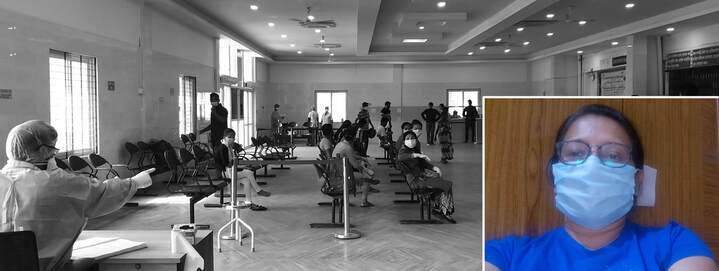
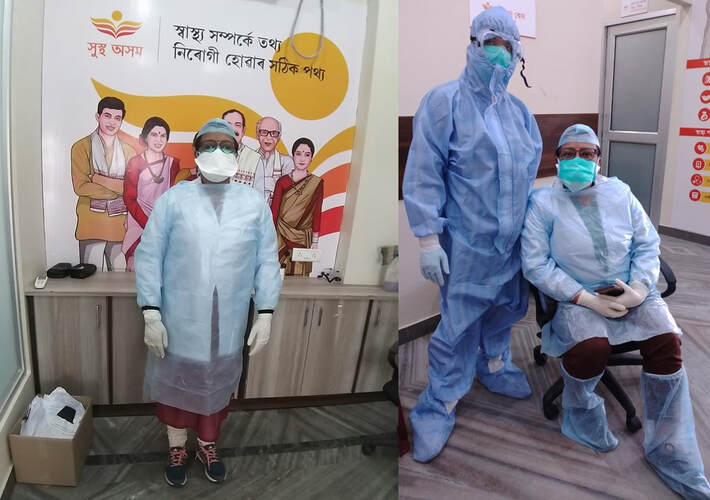
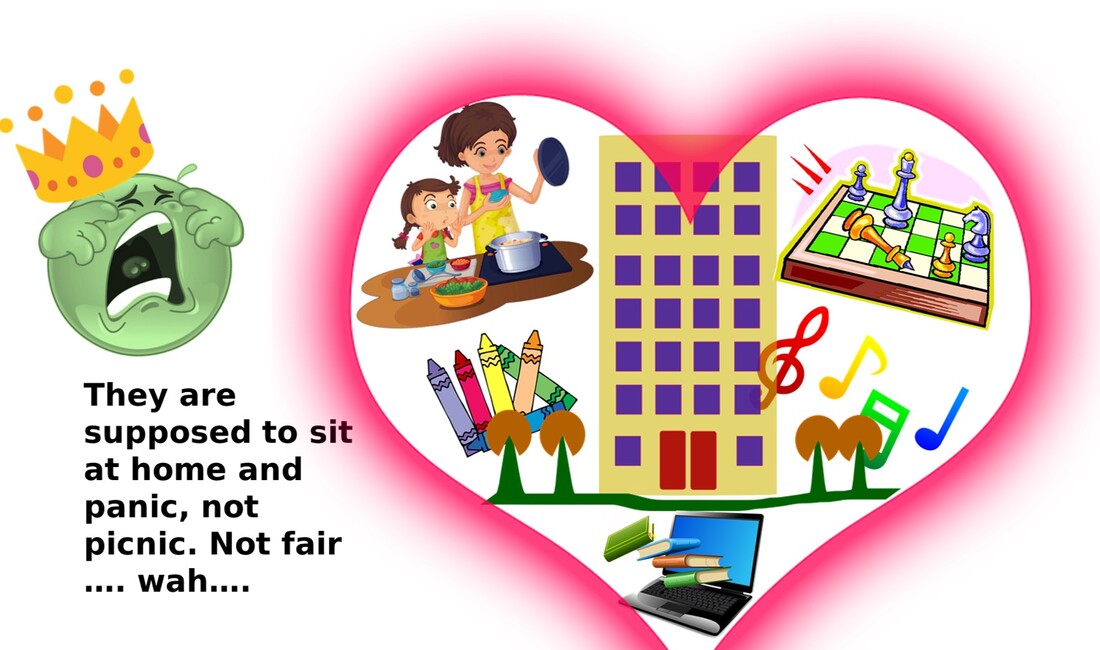
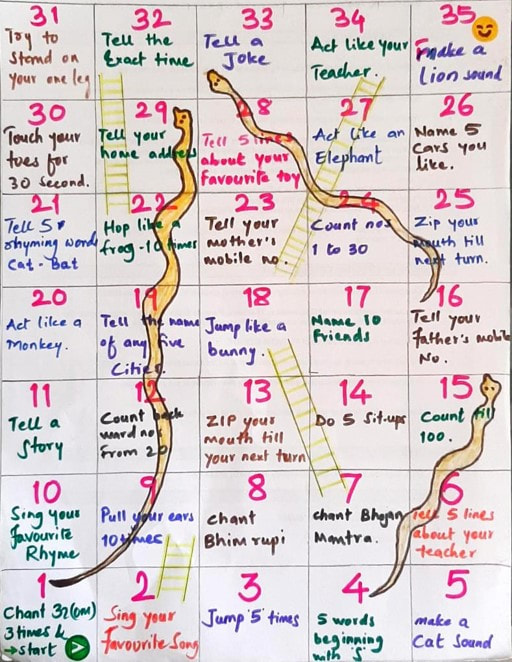
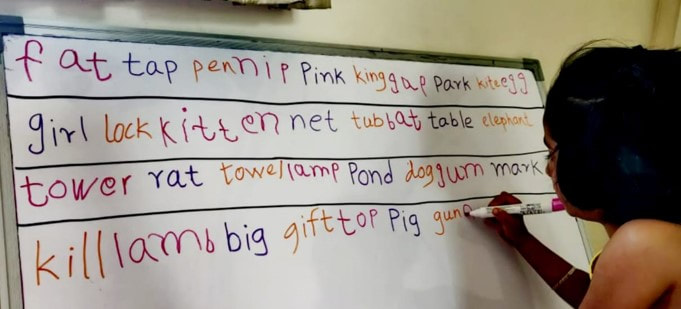
 RSS Feed
RSS Feed

